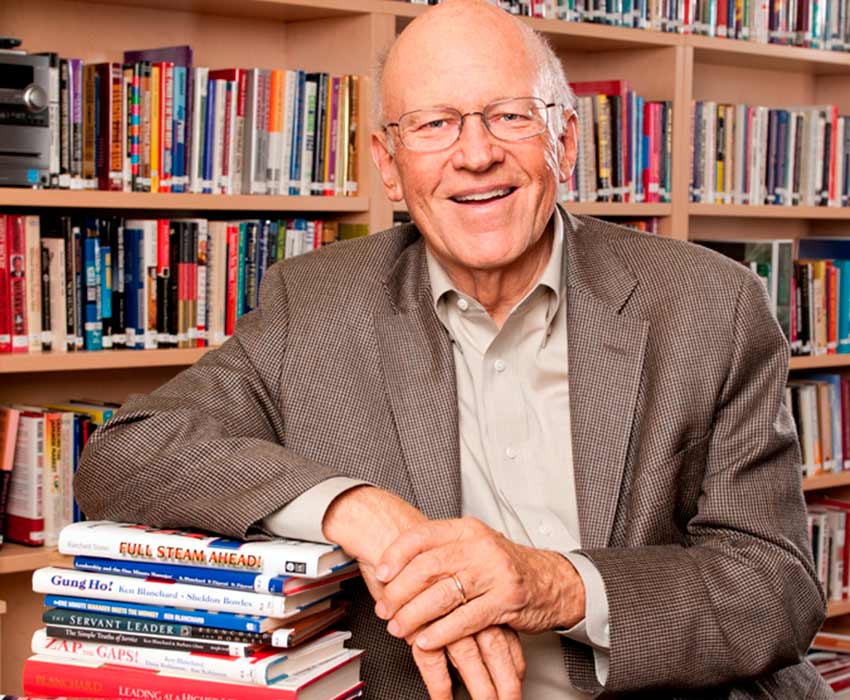26 April 2012
Putting servant leadership to the test
By Henry DeVries
When Ken Blanchard was a novice college professor back in the 1960s, he irked other faculty members because he distributed the final exam to students on the first day of class.

“Not only am I going to give them the questions to the final, what do you think I’m going to do all semester?,” said Blanchard to his collegiate colleagues. “I’m going to teach them the answers so when they get to the final exam, they get As.”
Today Blanchard is helping San Diegans ace a different kind of test: the success of the region’s future.
Blanchard, a champion of lifelong learning, is perhaps best known as the co-author of "The One-Minute Manager", a book that swept the business world three decades ago and since has sold 13 million copies in 27 languages.
Others know him for any of the 50 other books he has co-authored, many on management and leadership. Still others recognize him as the founder of the Escondido company that bears his name, an international training firm of 300 plus employees that helps companies improve their performance, productivity, and bottom-line results. The Ken Blanchard Companies is a global leader in workplace learning, productivity, performance, and leadership training solutions.
Blanchard, now in his seventies, no longer has an operational role in the company he founded (“I’m the CSO — the chief spiritual officer,” he says). Yet he continues to be what he has always been: a thinker, a motivator, and someone who strives to help better the world around him.
Among management concepts this entrepreneur embraces is one called servant leadership, something he has (you guessed it) written an entire book about.
“The servant leader is constantly trying to find out what his or her people need to be successful,” says Blanchard. “The role of the servant leader is to do anything that is necessary to help his or her people win and accomplish their goals.”
Find out what people need and want, then lead toward that goal.
“My dream is that in five years people will be flying into San Diego not just for the wonderful vacation destination or the fabulous weather—but to see how government, business, faith communities, and non-profits are all working together to solve problems,” he says.
Blanchard is chairman of Vision San Diego, a non-profit, public charity, that seeks to unify the San Diego region to serve the public good.
Vision San Diego is a neutral convener that seeks to bring people together that care about the same thing. The organization believes that government will never have a budget large enough to solve all the problems by itself. The role of Vision San Diego is to mobilize people of good faith and goodwill to be part of the solution.
The first step is to get the community engaged in meaningful conversations about the challenges facing the region.
Blanchard and Vision San Diego support the efforts of the San Diego Foundation, which is engaged in a program to determine the kind of region residents want in 50 to 100 years and how to bring it about. The first step was to identify four or five major urban challenges presumably foremost on the minds of citizens.
That was followed by an online survey seeking confirmation and asking their preferred solutions. The response was astounding, with more than 30,000 completed surveys.
Underway is a separate survey of a scientific sample of 1,037 people to gauge whether the broader poll was skewed. Next will come a formal initiative to help implement the people’s choices on the best balance of freeways and public transportation, urban core density versus expanded suburbia, and so on.
The goal is a better San Diego, as defined first by the people, and carried out with their support by civic leaders. Servant leadership? Indeed.
“Often when people work on a problem they have a kind of closed-loop approach,” says Blanchard. “Before you work on this problem, do you believe like I believe? Are you a Republican or a Democrat or a Jew or a Protestant? What it tells us is that it keeps people out and the circle keeps getting smaller: A better approach is “Do you care about what I care about, solving this problem? If you are interested in what I am interested in, then we can work together.”
Henry DeVries is co-author of "Closing America’s Job Gap" and assistant dean for external affairs at UC San Diego Extended Studies.